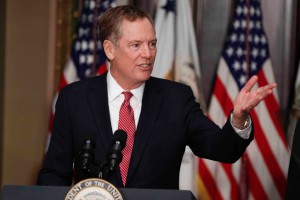
U.S. Trade Representative Robert Lighthizer reportedly took the 50% U.S. content demand off the table last week.
It appears that negotiations for the North American Free Trade Agreement are back on track after the Trump Administration relented on its demand that vehicles built in Canada and Mexico and exported to the U.S. must contain 50% U.S. content.
The demand, which Trump Administration officials were told by automakers would be impossible to implement, essentially brought the talks about revising the decades old trade deal between Canada, Mexico and the U.S. to a halt.
The Trump Administration had been seeking to raise the amount of NAFTA content in autos to 85% from 62.5% and secure 50% of the total for the United States.
(Tesla’s Musk wants Trump to expand trade war. To see why, Click Here.)
U.S. officials dropped the demand on the so-called rules of origin during extended discussions in Washington last week, which included talks between Canada’s Foreign Minister Chrystia Freeland and U.S. Trade Representative Robert Lighthizer, according to the Toronto Globe & Mail.
With that roadblock cleared, negotiators from all sides are due to meet next month for the eighth round of talks, to tackle other U.S. demands for changes to the $1.2 trillion trade agreement.
“We continue to be optimistic about our capacity to get to a good win-win-win (deal),” Canadian Prime Minister Justin Trudeau told reporters.
(Trump allies are ripping his tariff plan, Click Here.)
Reuters reported that the U.S. side, citing the need to finish before Mexican presidential elections in July, is now showing more flexibility.
Mexican officials said last week if the three sides did not finish the talks by the end of April, the process would drag on at least until the end of 2018, noting that Mexico’s presidential vote is on July 1 while U.S. congressional elections are set for November.
The push for higher content levels on vehicles exported to the U.S. was part of Trump’s campaign platform, in which he claimed if it weren’t raised to that level he would consider walking away from the pact between the three countries.
(Click Here to see more about the halted NAFTA talks and Trump’s proposed tariffs on steel, aluminum.)
It’s a threat he’s reiterated in recent weeks, but this shift away from the content demand suggests that the pleas of the automotive industry leaders have not fallen on deaf ears — at least for that provision of the deal.

All bluster, no results.